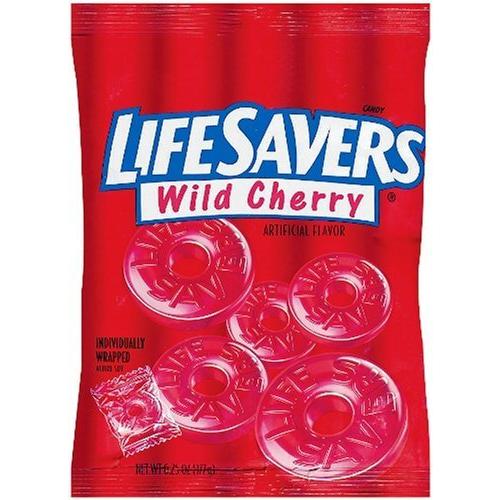What’s In My Food: Life Savers Ingredients Explained
Reading the ingredient list on your food label and knowing what they are, are two different things. For example: Do you know what the ingredients BHT, partially hydrogenated soybean oil, blue 1, and phosphoric acid are? Well you should, since you are consuming them on a daily basis. One's use is banned in restaurants. Another is mined from the earth. And the Other two are made from petroleum.
Can you imagine what these ingredients are doing to your body? Well don't imagine. Know. Educate yourself. Read on to learn exactly what your food is made of, and what it’s doing to your health.
In all products, ingredients must be listed according to their relative weight. The listing of each ingredient is in a descending order of predominance.
*Life Savers come in a variety of flavors. This article focuses on Life Savers Wild Cherry flavor.
Life Saver’s ingredients are: Sugar, corn syrup, high fructose corn syrup, citric acid, natural and artificial flavors, colors (red 40, blue 1).

1. Sugar: A sweetening additive. Made mainly from sugar cane and sugar beet.
Health effects: Safe if eaten in small amounts. Consumption of large amounts over time has been linked to tooth decay, periodontal disease, obesity, hyperactivity, B vitamin deficiencies, heart disease, and type 2 diabetes.
2. Corn syrup: Sweet syrup made from corn starch treated with acid or enzymes.
Health effects: May cause allergic reactions.
3. High fructose corn syrup: Corn derived sweetener. Corn starch is processed to corn syrup and then treated with enzymes to convert glucose in fructose.
Health Effects: Excess may increase risk of tooth decay, abnormal weight gain, kidney stones, gout, kidney stones, colon cancer, and diabetes. Large amounts have caused tumors in mice. In 2005, some U.S. manufactured high fructose corn syrup was found to contain trace amounts of mercury.
4. Citric acid: A weak organic acid used as a flavoring agent and a preservative. Extracted from citrus fruits or made by fermentation of yeast or mold. May contain MSG. May be genetically modified.
Health effects: If MSG sensitive, may provoke symptoms.
5. Natural flavors: Any flavor not chemically derived. Obtained by physical processes from plants or animals. Made to provide flavor to a food rather than nutritional value. May contain MSG.
Health effects: Unknown.Different foods use different natural flavors and processes. Naturally derived ingredients may be altered, rendered unsafe. It should be noted that the use of the word “natural flavors” is often used to mask the use of harmful, naturally derived flavors.
6. Artificial flavors: A synthetic mixture not found in nature, designed to mimic a natural flavor. May contain MSG. Over 1,700 artificial flavors are approved by the FDA.
Health effects: Unknown. Companies are not required to identify the various synthetic mixtures (1,700 to date) used in foods, requiring only that they be listed under the umbrella of the “artificial flavors” listing. Some individuals are sensitive to artificial flavors, experiencing headaches, nausea, and drowsiness, among other symptoms. Artificial flavors sample list: benzyl isobutyrate, ethyl acetate, ethyl methylphenylglycidate (petroleum derivative), methyl benzoate (petroleum derivative), hydroxyphenyl-2-butanone. An artificial flavor may be made up of any number of synthetic chemicals.
7. Red 40: (Known also as Allura Red AC, E129) Coal tar derived artificial food coloring.
Health effects: A suspected carcinogen. Has been linked to hyperactivity, Attention-Deficit Hyperactivity Disorder (ADHD), and lower IQs in children. Some scientists question its safety since all tests were conducted by the manufacturer instead of the regulator, the FDA.
8. Blue 1: (Known also as Brilliant Blue FCF, E133)Coal tar derived food coloring.
Health effects: Produces malignant tumors at the site of injection and by ingestion in rats. Possible effects include asthma, hives, hay fever, low blood pressure, allergic reactions. Caution is advised if aspirin sensitive.
Now you know the facts. You know what you are consuming, and can make an informed decision.








